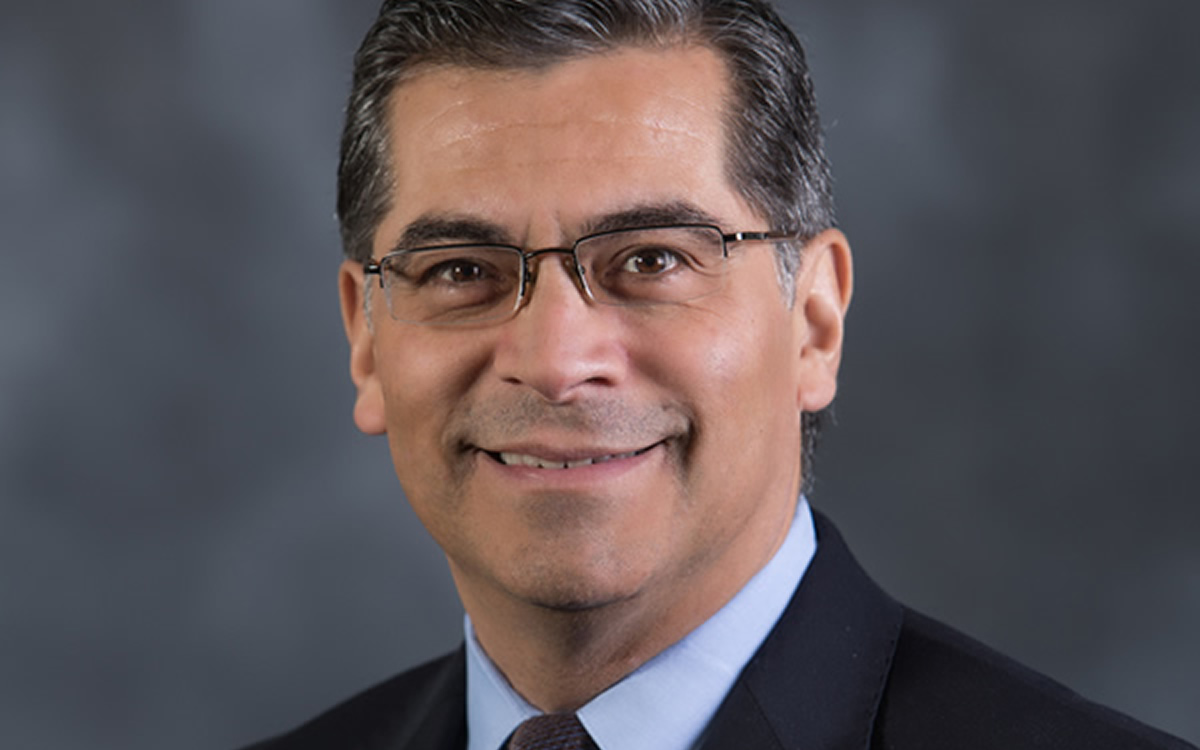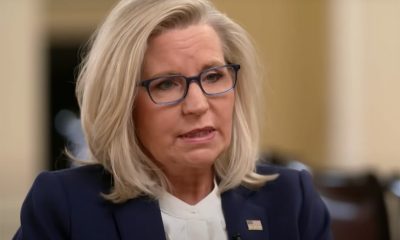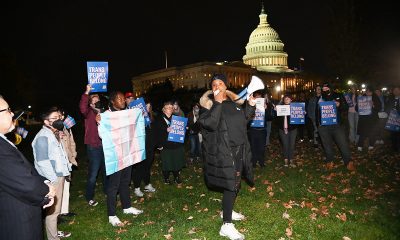National
Tea Party focus doesn’t include LGBT issues
Jobs, spending are priorities for nascent movement
The Tea Party is making headlines for energizing the Republican Party base and ousting incumbent GOP lawmakers from Congress, but some observers say the movement is having limited impact on LGBT issues.
The movement is focused on economic issues and limited government rather than anti-gay rhetoric in its bid for growth and acceptance.
Michael Cole, a Human Rights Campaign spokesperson, said the Tea Party movement has “taken a lot of the wind out of the LGBT demagoguery sails.”
“Their relentless focus on economic issues has really taken a lot of the attention away from some of the attacks on LGBT people that we usually see from elements of the conservative movement,” he said.
Cole acknowledged the Tea Party may have anti-gay extremists in its ranks, recalling how tea partiers reportedly called Rep. Barney Frank (D-Mass.) anti-gay epithets during a March rally at the U.S. Capitol, but maintained members of the movement have been reticent to address social issues.
“You don’t see as much rhetoric around choice or LGBT issues or some of the other things as you do around taxes and the deficit and health care and things like that,” he said.
Jimmy LaSalvia, executive director of GOProud, a gay conservative group, also maintained the focus of the Tea Party is on economic issues and not blocking the advancement of LGBT issues in Congress.
“The focus of the Tea Party is on fiscal issues and the growth of government, and their influence on Congress is to get Congress focused on those issues,” LaSalvia said. “And so, I think, if it’s having any influence on Congress, it’s telling Capitol Hill to wake up and quit spending all the money.”
But the perception that the Tea Party isn’t relevant to LGBT issues isn’t universal.
Michael Mitchell, executive director of the National Stonewall Democrats, characterized the Tea Party as the reincarnation of previous anti-gay movements.
“There is, indeed, a very conservative movement out there that is finding a voice and turning some races, but I believe it’s the same anti-equality, anti-gay elements that have been roadblocks and are going to be roadblocks for us,” Mitchell said.
Mitchell said he fears what will happen to LGBT issues if leaders from the Tea Party movement are elected to public office.
“I think if these Tea Party folks are in power – Sarah Palin, for example, if she were to somehow get back into power – believe me, our issues are not going to be anywhere near their agenda at all,” he said.
The fallout of recent Republican primaries suggests that LGBT issues may in fact be playing a role in how in the Tea Party is shaping national elections.
Sen. Lisa Murkowski (R-Alaska) was trailing in her bid to retain the Republican nomination following a primary last week that as of Blade deadline was too close to call.
Murkowski’s Tea Party opponent in the primary, Joe Miller, led the senator by 1,688 votes on Tuesday. The Alaska Division of Elections was set to count this week 15,272 absentee, questioned and early ballots as part of at least 25,500 uncounted ballots, according to the Associated Press.
Known in some circles as a moderate Republican, Murkowski was among four GOP senators to vote for cloture on attaching hate crimes protection legislation to the Fiscal Year 2010 Defense Authorization Act.
Miller, on the other hand, has on his campaign website a letter explaining his opposition to hate crimes laws because he says they violate First Amendment rights. The letter criticizes Murkowski for her vote for the measure.
“At the time of Senator Murkowski’s vote to expand hate crimes into the realm of sexual orientation, the latest FBI statistics at her disposal relating to crimes of bias motivated by sexual orientation reported exactly ONE case in all of Alaska,” writes Miller.
In Arizona, some observers believe the Tea Party also had an impact on moving Sen. John McCain (R-Ariz.) to become the most vocal opponent in the U.S. Senate of repealing “Don’t Ask, Don’t Tell” as he faced a primary challenge from J.D. Hayworth.
McCain has threatened to filibuster the fiscal year 2011 defense authorization bill based on the “Don’t Ask, Don’t Tell” repeal language and has spoken out against repeal in committee hearings. Before lawmakers broke for August recess, McCain objected to bringing the defense bill to the floor because of the repeal language.
The senator’s opposition to “Don’t Ask, Don’t Tell” repeal may have paid off in his primary last week. He trounced Hayworth in the Republican primary by securing 56 percent of the vote.
There is much debate about the Tea Party’s role in the aftermath of those campaigns.
LaSalvia maintained that Murkowski’s situation isn’t the result of her hate crimes vote because of her positions on government spending.
“She wasn’t voted out because she voted for hate crimes; she was voted out because she’s a porker,” LaSalvia said. “That’s a stretch to look at any race and draw a gay connection to really any race like that. The election cycle is shaping up to be an election about jobs, the economy and spending.”
Cole also said he didn’t think hate crimes legislation played a significant role in the Alaska primary.
“If you just look at the reporting afterwards analyzing the race, it was all about these sort of economic issues and these homegrown things,” he said. “Her vote on hate crimes I just never heard once brought up.”
As for McCain, Cole cautioned against making too much of his opposition to “Don’t Ask, Don’t Tell” repeal.
“John McCain had to move to the right on his primary challenge, but I think his primary shift was on immigration,” Cole said. “Certainly, he was never a fan of “Don’t Ask, Don’t Tell” repeal, and he increased his rhetoric faced from the threat with his right, but I think that those sorts of instances are exceptions rather than the rule for the way that these campaigns have been fought.”
Another example suggests that the Tea Party movement is throwing out incumbent Republicans regardless of their views on LGBT issues.
Sen. Robert Bennett (R-Utah), who was unable to secure the Republican nomination in May after finishing third in the second round of balloting at the Utah Republican Convention, has a strong anti-gay record this Congress.
In March, the Senate defeated the senator’s attempt to amend health care reform legislation to include a provision calling for a vote on same-sex marriage in D.C. Additionally, late last year, Bennett was the sole committee vote against reporting out the Domestic Partnership Benefits & Obligations Act to the Senate floor.
LaSalvia said Bennett’s loss of the Republican nomination even with this record underscores the Tea Party is focused on economic issues rather than social issues.
“Bob Bennett got voted out because he’s been part of the problem,” he said. “He’s been in Congress a long time and spent a lot of money and hasn’t stood up to change things.”
LaSalvia noted that Bennett’s vote for the bank bailout as part of the Troubled Asset Relief Program was among the actions that frustrated Republican voters.
Federal Government
HHS reverses Trump-era anti-LGBTQ rule
Section 1557 of the Affordable Care Act now protects LGBTQ people

The U.S. Department of Health and Human Services Office for Civil Rights has issued a final rule on Friday under Section 1557 of the Affordable Care Act advancing protections against discrimination in health care prohibiting discrimination on the basis of race, color, national origin, age, disability, or sex (including pregnancy, sexual orientation, gender identity, and sex characteristics), in covered health programs or activities.
The updated rule does not force medical professionals to provide certain types of health care, but rather ensures nondiscrimination protections so that providers cannot turn away patients based on individual characteristics such as being lesbian, gay, bisexual, transgender, queer, intersex, or pregnant.
“This rule ensures that people nationwide can access health care free from discrimination,” said HHS Secretary Xavier Becerra. “Standing with communities in need is critical, particularly given increased attacks on women, trans youth, and health care providers. Health care should be a right not dependent on looks, location, love, language, or the type of care someone needs.”
The new rule restores and clarifies important regulatory protections for LGBTQ people and other vulnerable populations under Section 1557, also known as the health care nondiscrimination law, that were previously rescinded by the Trump administration.
“Healthcare is a fundamental human right. The rule released today restores critical regulatory nondiscrimination protections for those who need them most and ensures a legally proper reading of the Affordable Care Act’s healthcare nondiscrimination law,” said Omar Gonzalez-Pagan, counsel and health care strategist for Lambda Legal.
“The Biden administration today reversed the harmful, discriminatory, and unlawful effort by the previous administration to eliminate critical regulatory protections for LGBTQ+ people and other vulnerable populations, such as people with limited English proficiency, by carving them out from the rule and limiting the scope of entities to which the rule applied,” Gonzalez-Pagan added. “The rule released today has reinstated many of these important protections, as well as clarifying the broad, intended scope of the rule to cover all health programs and activities and health insurers receiving federal funds. While we evaluate the new rule in detail, it is important to highlight that this rule will help members of the LGBTQ+ community — especially transgender people, non-English speakers, immigrants, people of color, and people living with disabilities — to access the care they need and deserve, saving lives and making sure healthcare professionals serve patients with essential care no matter who they are.”
In addition to rescinding critical regulatory protections for LGBTQ people, the Trump administration’s rule also limited the remedies available to people who face health disparities, limited access to health care for people with Limited English Proficiency, and dramatically reduced the number of healthcare entities and health plans subject to the rule.
Lambda Legal, along with a broad coalition of LGBTQ advocacy groups, filed a lawsuit challenging the Trump administration rule, Whitman-Walker Clinic v. HHS, and secured a preliminary injunction preventing key aspects of the Trump rule from taking effect.
These included the elimination of regulatory protections for LGBTQ people and the unlawful expansion of religious exemptions, which the new rule corrects. The preliminary injunction in Whitman-Walker Clinic v. HHS remains in place. Any next steps in the case will be determined at a later time, after a fulsome review of the new rule.
GLAAD President Sarah Kate Ellis released the following statement in response to the news:
“The Biden administration’s updates to rules regarding Section 1557 of the ACA will ensure that no one who is LGBTQI or pregnant can face discrimination in accessing essential health care. This reversal of Trump-era discriminatory rules that sought to single out Americans based on who they are and make it difficult or impossible for them to access necessary medical care will have a direct, positive impact on the day to day lives of millions of people. Today’s move marks the 334th action from the Biden-Harris White House in support of LGBTQ people. Health care is a human right that should be accessible to all Americans equally without unfair and discriminatory restrictions. LGBTQ Americans are grateful for this step forward to combat discrimination in health care so no one is barred from lifesaving treatment.”
The White House
Four states to ignore new Title IX rules protecting transgender students
Biden administration last Friday released final regulations

BY ERIN REED | Last Friday, the Biden administration released its final Title IX rules, which include protections for LGBTQ students by clarifying that Title IX forbids discrimination based on sexual orientation and gender identity.
The rule change could have a significant impact as it would supersede bathroom bans and other discriminatory policies that have become increasingly common in Republican states within the U.S.
As of Thursday morning, however, officials in at least four states — Oklahoma, Louisiana, Florida, and South Carolina — have directed schools to ignore the regulations, potentially setting up a federal showdown that may ultimately end up in a protracted court battle in the lead-up to the 2024 elections.
Louisiana State Superintendent of Education Cade Brumley was the first to respond, decrying the fact that the new Title IX regulations could block teachers and other students from exercising what has been dubbed by some a “right to bully” transgender students by using their old names and pronouns intentionally.
Asserting that Title IX law does not protect trans and queer students, Brumley states that schools “should not alter policies or procedures at this time.” Critically, several courts have ruled that trans and queer students are protected by Title IX, including the 4th U.S. Circuit Court of Appeals in a recent case in West Virginia.
In South Carolina, Schools Supt. Ellen Weaver wrote in a letter that providing protections for trans and LGBTQ students under Title IX “would rescind 50 years of progress and equality of opportunity by putting girls and women at a disadvantage in the educational arena,” apparently leaving trans kids out of her definition of those who deserve progress and equality of opportunity.
She then directed schools to ignore the new directive while waiting for court challenges. While South Carolina does not have a bathroom ban or statewide “Don’t Say Gay or Trans” law, such bills continue to be proposed in the state.
Responding to the South Carolina letter, Chase Glenn of Alliance For Full Acceptance stated, “While Supt. Weaver may not personally support the rights of LGBTQ+ students, she has the responsibility as the top school leader in our state to ensure that all students have equal rights and protections, and a safe place to learn and be themselves. The flagrant disregard shown for the Title IX rule tells me that our superintendent unfortunately does not have the best interests of all students in mind.”
Florida Education Commissioner Manny Diaz also joined in instructing schools not to implement Title IX regulations. In a letter issued to area schools, Diaz stated that the new Title IX regulations were tantamount to “gaslighting the country into believing that biological sex no longer has any meaning.”
Governor Ron DeSantis approved of the letter and stated that Florida “will not comply.” Florida has notably been the site of some of the most viciously anti-queer and anti-trans legislation in recent history, including a “Don’t Say Gay or Trans” law that was used to force a trans female teacher to go by “Mr.”
State Education Supt. Ryan Walters of Oklahoma was the latest to echo similar sentiments. Walters has recently appointed the right-wing media figure Chaya Raichik of Libs of TikTok to an advisory role “to improve school safety,” and notably, Raichik has posed proudly with papers accusing her of instigating bomb threats with her incendiary posts about LGBTQ people in classrooms.
The Title IX policies have been universally applauded by large LGBTQ rights organizations in the U.S. Lambda Legal, a key figure in fighting anti-LGBTQ legislation nationwide, said that the regulations “clearly cover LGBTQ+ students, as well as survivors and pregnant and parenting students across race and gender identity.” The Human Rights Campaign also praised the rule, stating, “rule will be life-changing for so many LGBTQ+ youth and help ensure LGBTQ+ students can receive the same educational experience as their peers: Going to dances, safely using the restroom, and writing stories that tell the truth about their own lives.”
The rule is slated to go into effect Aug. 1, pending any legal challenges.
****************************************************************************

Erin Reed is a transgender woman (she/her pronouns) and researcher who tracks anti-LGBTQ+ legislation around the world and helps people become better advocates for their queer family, friends, colleagues, and community. Reed also is a social media consultant and public speaker.
******************************************************************************************
The preceding article was first published at Erin In The Morning and is republished with permission.
Pennsylvania
Malcolm Kenyatta could become the first LGBTQ statewide elected official in Pa.
State lawmaker a prominent Biden-Harris 2024 reelection campaign surrogate

Following his win in the Democratic primary contest on Wednesday, Pennsylvania state Rep. Malcolm Kenyatta, who is running for auditor general, is positioned to potentially become the first openly LGBTQ elected official serving the commonwealth.
In a statement celebrating his victory, LGBTQ+ Victory Fund President Annise Parker said, “Pennsylvanians trust Malcolm Kenyatta to be their watchdog as auditor general because that’s exactly what he’s been as a legislator.”
“LGBTQ+ Victory Fund is all in for Malcolm, because we know he has the experience to win this race and carry on his fight for students, seniors and workers as Pennsylvania’s auditor general,” she said.
Parker added, “LGBTQ+ Americans are severely underrepresented in public office and the numbers are even worse for Black LGBTQ+ representation. I look forward to doing everything I can to mobilize LGBTQ+ Pennsylvanians and our allies to get out and vote for Malcolm this November so we can make history.”
In April 2023, Kenyatta was appointed by the White House to serve as director of the Presidential Advisory Commission on Advancing Educational Equity, Excellence and Economic Opportunity for Black Americans.
He has been an active surrogate in the Biden-Harris 2024 reelection campaign.
-

 District of Columbia4 days ago
District of Columbia4 days agoCatching up with the asexuals and aromantics of D.C.
-

 South America3 days ago
South America3 days agoArgentina government dismisses transgender public sector employees
-

 Maine5 days ago
Maine5 days agoMaine governor signs transgender, abortion sanctuary bill into law
-

 District of Columbia4 days ago
District of Columbia4 days agoBowser budget proposal calls for $5.25 million for 2025 World Pride











